Click on photos for full view.
Kristen Stewart Is Calling the Shots
The Love Lies Bleeding star joins fellow actor-turned-director Riley Keough in conversation for our March cover.
For the better part of two decades, Kristen Stewart has moved through Hollywood like a chameleon, slipping into a mélange of characters and subverting expectations at every turn. Traversing seamlessly from a fantasy world of vampires and werewolves to that of a legendary 1970s rock frontwoman and jumping from a queer home-for-the-holidays rom-com to an Oscar-nominated turn as the people's princess is Stewart's speciality. You can't pinpoint any kind of project-picking philosophy (by choice, I imagine) other than maybe a desire to play multifaceted women who defy societal norms. Her ability to keep audiences guessing with every project, much like with her unquestionably cool beauty and fashion transformations, is what makes Stewart one of the most impressive actors of our generation.
In Rose Glass's sophomore film Love Lies Bleeding, Stewart's performance is as liberated as they come. The heart-pounding romantic noir thriller is a roided-up, sweaty, violent fever dream set against the backdrop of 1989 rural New Mexico. Stewart plays Lou, a reclusive gym manager with a shaggy mullet and a dodgy family led by her gun-toting father (Ed Harris). Lou seems to be going nowhere fast in her seedy small town until Jackie (Katy O'Brian), an aspiring bodybuilder, shows up from Oklahoma and irrevocably shakes things up. The pair quickly become an item with big plans of getting out of town when a terrible decision, spawned by a growing steroid habit, leads to murder.
Love Lies Bleeding first premiered to rave reviews at the Sundance Film Festival in January, where Stewart was honored with a Visionary Award and declared she wouldn't act in another film until her own directorial debut, an adaptation of Lidia Yuknavitch's memoir The Chronology of Water, got financing. After shopping the project around for nearly three years—"too fucking long," she shouts—Stewart finally found her funding. And not a moment too soon. On the verge of a life-changing career milestone, she jumped on the phone with her good friend and fellow actor-turned-director Riley Keough to talk about going bombastic for Love Lies Bleeding, the divine timing of directing her first film, and coming up in a different era of Hollywood.
Riley Keough: Hi!
Kristen Stewart: Hey, what's up?
RK: Oh my gosh. I'm so happy to see you. Where are you?
KS: I'm in my house.
RK: Very cool.
KS: To leave the responsibility of conducting something readable in our hands is just funny. I thought twice about that. … I was like, "Cool, I get to hang out with Ri for 50 minutes. That sounds nice." But then I was like, "Wait, do we want other people to be privy to the swill?" There's nothing good that will be had.
RK: It's okay because I have prompts, so I'm going to stick to the page. Well firstly, … I got to see this incredible movie when I was in bed with COVID, which was really a trippy experience because when I had COVID—I'm in England—I had this crazy dream that a demon took over my body. I went to bed, and I woke up and called my energy healer because I was like, "I literally just had a dream that a demon took my body over and started wanting to kill people." I got your movie sent to me that day.
KS: Was the desire to kill something you knew as a fact, like in the reality of the dream, or did you actually experience that need to murder?
RK: I can't believe I'm saying this in an interview. I've never told anyone this but my therapist, but it was like a demon took over my body, and it was like, "Rawrrr!" It was threatening people, and I was like, "What is taking over?" It was so crazy. I felt like there was another entity in my body.
KS: Like you were out of control.
RK: I was totally out of control.
KS: Like Being John Malkovich style—going, "Oh shit!"
RK: I woke up with COVID, so maybe that was the COVID aggressively entering my body in my dreams. And then I had to watch Love Lies Bleeding. It was just so intense, but it was actually amazing. I was like, "This is great. At least, I'm not alone."
KS: I was going to say that's a trippy alone watch. That is a movie that you'd like to get caught up in a bit of a raucous time with others versus sitting still and alone with.
RK: It's so great, but also, you're so good in it.
KS: Thanks, dude.
RK: Maybe this doesn't feel right to you, but when I was watching you, you felt so free and so liberated in your performance. I don't know if it felt that way when you were performing it, but it felt very … alive and free.
KS: It's weird because the character is also kind of paralyzed, so at the same time, she's not somebody who is free, or I don't think you would necessarily pin "liberated" on her.
RK: No, she's not, and that's what is so weird. … If I read that on the page, I would have played her much more restrained. I can't describe it, but it was really special. It was just so interesting, and I would just like you to speak to that.
KS: It was good timing, in that getting older and choosing the right things for you plays into it because I had so much fucking fun. I didn't want to stop doing it ever. I wanted us to go over schedule. We were lucky because we got the chance to take a step back and return to it and do "reshoots," which really just felt like an extension of the process. The script was precise, but the whole thing felt malleable the whole time. … [Rose Glass] really allowed people to come in and inhabit this space in a way that is rare, and I really did relish the opportunity and was obsessed with Lou. She was someone that I really needed to get behind the whole time. … She's a protagonist that is so satisfying because we all have this demon and this monster in there that is like, "Maybe I could be awful. Maybe I scare the shit out of myself."
Also tonally, this person is someone who is not used to being looked at, so there's this weird, tongue-in-cheek, rye, smirky thing that happens in this movie for me. I'm so aware of the fact that this is usually not the main character. Every time the camera is all about me—and Lou I guess—I'm always like, "Wait, are you fucking kidding me?" I'm literally having a ball, and that's probably what you sensed. She's definitely locked up and weird and in a million ways unprocessed and needs so much therapy, but it was so fun to play the good, affable guy that … doesn't have to be morally upstanding or go through some journey, process thing that makes everyone feel better about the movies and stories that we choose to tell about women. I was so stoked about how different and fun and also just [how] 'fuck off' sexy it was. I was like, "Rose, who the fuck are you?!"
KS: Was the desire to kill something you knew as a fact, like in the reality of the dream, or did you actually experience that need to murder?
RK: I can't believe I'm saying this in an interview. I've never told anyone this but my therapist, but it was like a demon took over my body, and it was like, "Rawrrr!" It was threatening people, and I was like, "What is taking over?" It was so crazy. I felt like there was another entity in my body.
KS: Like you were out of control.
RK: I was totally out of control.
KS: Like Being John Malkovich style—going, "Oh shit!"
RK: I woke up with COVID, so maybe that was the COVID aggressively entering my body in my dreams. And then I had to watch Love Lies Bleeding. It was just so intense, but it was actually amazing. I was like, "This is great. At least, I'm not alone."
KS: I was going to say that's a trippy alone watch. That is a movie that you'd like to get caught up in a bit of a raucous time with others versus sitting still and alone with.
RK: It's so great, but also, you're so good in it.
KS: Thanks, dude.
I was so stoked about how different and fun and also just [how] 'fuck off' sexy it was.
RK: Maybe this doesn't feel right to you, but when I was watching you, you felt so free and so liberated in your performance. I don't know if it felt that way when you were performing it, but it felt very … alive and free.
KS: It's weird because the character is also kind of paralyzed, so at the same time, she's not somebody who is free, or I don't think you would necessarily pin "liberated" on her.
RK: No, she's not, and that's what is so weird. … If I read that on the page, I would have played her much more restrained. I can't describe it, but it was really special. It was just so interesting, and I would just like you to speak to that.
KS: It was good timing, in that getting older and choosing the right things for you plays into it because I had so much fucking fun. I didn't want to stop doing it ever. I wanted us to go over schedule. We were lucky because we got the chance to take a step back and return to it and do "reshoots," which really just felt like an extension of the process. The script was precise, but the whole thing felt malleable the whole time. … [Rose Glass] really allowed people to come in and inhabit this space in a way that is rare, and I really did relish the opportunity and was obsessed with Lou. She was someone that I really needed to get behind the whole time. … She's a protagonist that is so satisfying because we all have this demon and this monster in there that is like, "Maybe I could be awful. Maybe I scare the shit out of myself."
Also tonally, this person is someone who is not used to being looked at, so there's this weird, tongue-in-cheek, rye, smirky thing that happens in this movie for me. I'm so aware of the fact that this is usually not the main character. Every time the camera is all about me—and Lou I guess—I'm always like, "Wait, are you fucking kidding me?" I'm literally having a ball, and that's probably what you sensed. She's definitely locked up and weird and in a million ways unprocessed and needs so much therapy, but it was so fun to play the good, affable guy that … doesn't have to be morally upstanding or go through some journey, process thing that makes everyone feel better about the movies and stories that we choose to tell about women. I was so stoked about how different and fun and also just [how] 'fuck off' sexy it was. I was like, "Rose, who the fuck are you?!"
RK: I was just constantly surprised with this film and also your character. I was like, "Okay, it's this thing. This is the character," and then it was different. You brought so much texture to it. You know when you watch something and you're like, "Oh, I wouldn't have thought of that. I wouldn't have done that"? I love when I watch performances like that. There are moments where you're so funny.
KS: I feel that way about you constantly. It's not nonsense. It's true reciprocation. I genuinely feel that way every time I watch you in a movie.
RK: Thanks! It was … not what I would have expected or done or chose, so I really loved watching you.
KS: Rose had to consistently remind me of tone because I would always go under, and she'd be like, "No, no." She'd push us toward ballistic, like bombastic. How good is Anna Baryshnikov [in the movie]?
RK: Oh my gosh, I was like, "This girl is so crazy." The acting was so great. Everyone was psychotic.
KS: I was so impressed with her in person, in real time. I tend to be probably so annoying to directors. I'll take things so literal in the moment for some reason, and then give me a couple days, and I'm like, "I don't know why I was hung up on that. I'm so sorry. That was such an irrelevant detail."
RK: Sometimes, acting is like you're drunk or something because you're not totally yourself. I'll behave in ways I don't normally behave and get total tunnel vision. It's like, "I'm sorry for my behavior."
KS: Yeah, you go to bed at night and wake up and go, "Oh" the same way you might if you were being an idiot while drunk.
RK: What was the prep [for the film] like?
KS: Ours was really standard. We read the script a couple of times together and probably had different conversations about the script at once. We were all talking at each other about different things and not really coming to any enlightening conclusions. … I actually had to reverse—I had quit smoking [prior to shooting the film], so it really sucked having to [go back].
RK: I was curious. I was like, "Are you smoking fake cigs in this movie?"
KS: No, they were real.
RK: I was like, "There's no way she's smoking fake cigs."
KS: Yucky. You can't do that.
RK: They are so gross.
KS: They are fucking awful, and also, they don't smoke. You know what I mean? They smolder, and they get in your eyes, and you look like a loser. But that sucked. That was a part of the prep.
RK: Why did you quit smoking?
KS: I think it's something [we] should all do at some point in our lives.
RK: Did you quit quit?
KS: Yeah, I don't like making promises or whatever, but I don't like smoking cigarettes anymore. [Lou] smokes a fucking lot of cigarettes in the beginning of this movie, and Rose does takes. We don't do things three times. It was fun. We always really pushed things. I took a couple years off my life on this one. It was worth it. I love this movie, but it was not good.
Chanel shirt, shorts, and bag; Hue socks; Piaget bracelet
Kristen Stewart Is Calling the Shots
The Love Lies Bleeding star joins fellow actor-turned-director Riley Keough in conversation for our March cover.
For the better part of two decades, Kristen Stewart has moved through Hollywood like a chameleon, slipping into a mélange of characters and subverting expectations at every turn. Traversing seamlessly from a fantasy world of vampires and werewolves to that of a legendary 1970s rock frontwoman and jumping from a queer home-for-the-holidays rom-com to an Oscar-nominated turn as the people's princess is Stewart's speciality. You can't pinpoint any kind of project-picking philosophy (by choice, I imagine) other than maybe a desire to play multifaceted women who defy societal norms. Her ability to keep audiences guessing with every project, much like with her unquestionably cool beauty and fashion transformations, is what makes Stewart one of the most impressive actors of our generation.
In Rose Glass's sophomore film Love Lies Bleeding, Stewart's performance is as liberated as they come. The heart-pounding romantic noir thriller is a roided-up, sweaty, violent fever dream set against the backdrop of 1989 rural New Mexico. Stewart plays Lou, a reclusive gym manager with a shaggy mullet and a dodgy family led by her gun-toting father (Ed Harris). Lou seems to be going nowhere fast in her seedy small town until Jackie (Katy O'Brian), an aspiring bodybuilder, shows up from Oklahoma and irrevocably shakes things up. The pair quickly become an item with big plans of getting out of town when a terrible decision, spawned by a growing steroid habit, leads to murder.
Love Lies Bleeding first premiered to rave reviews at the Sundance Film Festival in January, where Stewart was honored with a Visionary Award and declared she wouldn't act in another film until her own directorial debut, an adaptation of Lidia Yuknavitch's memoir The Chronology of Water, got financing. After shopping the project around for nearly three years—"too fucking long," she shouts—Stewart finally found her funding. And not a moment too soon. On the verge of a life-changing career milestone, she jumped on the phone with her good friend and fellow actor-turned-director Riley Keough to talk about going bombastic for Love Lies Bleeding, the divine timing of directing her first film, and coming up in a different era of Hollywood.
Riley Keough: Hi!
Kristen Stewart: Hey, what's up?
RK: Oh my gosh. I'm so happy to see you. Where are you?
KS: I'm in my house.
RK: Very cool.
KS: To leave the responsibility of conducting something readable in our hands is just funny. I thought twice about that. … I was like, "Cool, I get to hang out with Ri for 50 minutes. That sounds nice." But then I was like, "Wait, do we want other people to be privy to the swill?" There's nothing good that will be had.
RK: It's okay because I have prompts, so I'm going to stick to the page. Well firstly, … I got to see this incredible movie when I was in bed with COVID, which was really a trippy experience because when I had COVID—I'm in England—I had this crazy dream that a demon took over my body. I went to bed, and I woke up and called my energy healer because I was like, "I literally just had a dream that a demon took my body over and started wanting to kill people." I got your movie sent to me that day.
KS: Was the desire to kill something you knew as a fact, like in the reality of the dream, or did you actually experience that need to murder?
RK: I can't believe I'm saying this in an interview. I've never told anyone this but my therapist, but it was like a demon took over my body, and it was like, "Rawrrr!" It was threatening people, and I was like, "What is taking over?" It was so crazy. I felt like there was another entity in my body.
KS: Like you were out of control.
RK: I was totally out of control.
KS: Like Being John Malkovich style—going, "Oh shit!"
RK: I woke up with COVID, so maybe that was the COVID aggressively entering my body in my dreams. And then I had to watch Love Lies Bleeding. It was just so intense, but it was actually amazing. I was like, "This is great. At least, I'm not alone."
KS: I was going to say that's a trippy alone watch. That is a movie that you'd like to get caught up in a bit of a raucous time with others versus sitting still and alone with.
RK: It's so great, but also, you're so good in it.
KS: Thanks, dude.
I was so stoked about how different and fun and also just [how] 'fuck off' sexy it was.
RK: Maybe this doesn't feel right to you, but when I was watching you, you felt so free and so liberated in your performance. I don't know if it felt that way when you were performing it, but it felt very … alive and free.
KS: It's weird because the character is also kind of paralyzed, so at the same time, she's not somebody who is free, or I don't think you would necessarily pin "liberated" on her.
RK: No, she's not, and that's what is so weird. … If I read that on the page, I would have played her much more restrained. I can't describe it, but it was really special. It was just so interesting, and I would just like you to speak to that.
KS: It was good timing, in that getting older and choosing the right things for you plays into it because I had so much fucking fun. I didn't want to stop doing it ever. I wanted us to go over schedule. We were lucky because we got the chance to take a step back and return to it and do "reshoots," which really just felt like an extension of the process. The script was precise, but the whole thing felt malleable the whole time. … [Rose Glass] really allowed people to come in and inhabit this space in a way that is rare, and I really did relish the opportunity and was obsessed with Lou. She was someone that I really needed to get behind the whole time. … She's a protagonist that is so satisfying because we all have this demon and this monster in there that is like, "Maybe I could be awful. Maybe I scare the shit out of myself."
Also tonally, this person is someone who is not used to being looked at, so there's this weird, tongue-in-cheek, rye, smirky thing that happens in this movie for me. I'm so aware of the fact that this is usually not the main character. Every time the camera is all about me—and Lou I guess—I'm always like, "Wait, are you fucking kidding me?" I'm literally having a ball, and that's probably what you sensed. She's definitely locked up and weird and in a million ways unprocessed and needs so much therapy, but it was so fun to play the good, affable guy that … doesn't have to be morally upstanding or go through some journey, process thing that makes everyone feel better about the movies and stories that we choose to tell about women. I was so stoked about how different and fun and also just [how] 'fuck off' sexy it was. I was like, "Rose, who the fuck are you?!"
RK: I was just constantly surprised with this film and also your character. I was like, "Okay, it's this thing. This is the character," and then it was different. You brought so much texture to it. You know when you watch something and you're like, "Oh, I wouldn't have thought of that. I wouldn't have done that"? I love when I watch performances like that. There are moments where you're so funny.
KS: I feel that way about you constantly. It's not nonsense. It's true reciprocation. I genuinely feel that way every time I watch you in a movie.
RK: Thanks! It was … not what I would have expected or done or chose, so I really loved watching you.
KS: Rose had to consistently remind me of tone because I would always go under, and she'd be like, "No, no." She'd push us toward ballistic, like bombastic. How good is Anna Baryshnikov [in the movie]?
RK: Oh my gosh, I was like, "This girl is so crazy." The acting was so great. Everyone was psychotic.
KS: I was so impressed with her in person, in real time. I tend to be probably so annoying to directors. I'll take things so literal in the moment for some reason, and then give me a couple days, and I'm like, "I don't know why I was hung up on that. I'm so sorry. That was such an irrelevant detail."
RK: Sometimes, acting is like you're drunk or something because you're not totally yourself. I'll behave in ways I don't normally behave and get total tunnel vision. It's like, "I'm sorry for my behavior."
KS: Yeah, you go to bed at night and wake up and go, "Oh" the same way you might if you were being an idiot while drunk.
RK: What was the prep [for the film] like?
KS: Ours was really standard. We read the script a couple of times together and probably had different conversations about the script at once. We were all talking at each other about different things and not really coming to any enlightening conclusions. … I actually had to reverse—I had quit smoking [prior to shooting the film], so it really sucked having to [go back].
RK: I was curious. I was like, "Are you smoking fake cigs in this movie?"
KS: No, they were real.
RK: I was like, "There's no way she's smoking fake cigs."
KS: Yucky. You can't do that.
RK: They are so gross.
KS: They are fucking awful, and also, they don't smoke. You know what I mean? They smolder, and they get in your eyes, and you look like a loser. But that sucked. That was a part of the prep.
RK: Why did you quit smoking?
KS: I think it's something [we] should all do at some point in our lives.
RK: Did you quit quit?
KS: Yeah, I don't like making promises or whatever, but I don't like smoking cigarettes anymore. [Lou] smokes a fucking lot of cigarettes in the beginning of this movie, and Rose does takes. We don't do things three times. It was fun. We always really pushed things. I took a couple years off my life on this one. It was worth it. I love this movie, but it was not good.
RK: Okay, I'm going to go to my list so I can do some of the questions…
KS: What are you working on right now?
RK: I'm working on a movie in London. I'm rehearsing.
KS: That's nice. That's such a nice, comfy, cozy rehearsal schedule. That's so luxurious.
RK: Yeah, I only work like eight days in total, so I have some chill time.
KS: Except it's not chill to only work eight days on a movie because then you're like, "Okay, I better fucking slaughter this."
RK: I don't know what it is, but taking [a supporting role] is so much more stressful for me. Do you feel that?
KS: Yeah, you are signing up for torture because you just put so much pressure on your limited time to get something across. I recently had to let a part go in a movie that I know is going to be spectacular. It's one of those ones where the script is so prosaic. It's basically like a novella. You could publish the screenplay. The two actors are two of my favorite working actors, young too. [They're] exciting people who are just so fucking amazing. … All details aside, my movie [The Chronology of Water] just got funded.
RK: I just heard! We should talk about that. That's so exciting. After how long of trying to get financed?
KS: I was trying to get financed for like three years. … But I've been holding this close, and it's been an idea for six years. That's when the adaptation process started. I've been in Latvia. Dude, spatially and environmentally, these areas of the Earth are opening themselves up to us and the story in a way that just feels so alive, and it is so official for me because it's been so long. I'll see the correct doorway and just lose it. Just knowing the people there that are helping us make it, the way that we've crewed up, the current cast, the way it's evolving… All of it, like how committed [the lead] Imogen [Poots] has been for so long, it feels more personal. I feel like I created a living body outside of my body. It's such a cliché, but it does feel like this little animal is very unruly, and I'm proud of it and scared of it—like full Frankenstein.
I'm scared of where it might take us, but then I'm also encouraging it to take us fully over every edge. I think Imogen can take it. I think she's strong enough physically. She's in the perfect place in her life. I'm so glad it's taken this long because things have opened up in a way that's going to create a better film. I think it's … perfect, exact fucking timing, and I'm so excited. It's going to be done in a flash. Three months and it's fucking done.
RK: It will be over, so just enjoy every stressful moment. The couple things in life that I really have experienced divine timing in, thus far, have been the birth of my child and then directing a film. It really comes together exactly when it's supposed to, and it's so weird. … It's a really magical thing that I haven't experienced in other parts of this job as much, like acting or whatever.
KS: Yeah, because you're harvesting something. … It is other people who generated the thing. You can find areas in which to plug in your person and your personal and your interior life, but it's exterior. You are going through something outside. It's such a different self-generative, womb-like push.
RK: It sounds so simple, but it is so magical to see something come from your creative imagination and then get realized. … Look, there are so many drafts that we did. I'll forget what we took in or left out sometimes. You're doing your job, whatever you're doing as a director, and then somebody walks in with a yellow pen because you wrote, "She's holding a yellow pen," and you're like, "Whoa."
KS: Whoa, I wrote that like six years ago. Thank you for noticing that detail, person.
RK: This whole thing takes on a life, and it's like, "Wow, all of these people are bringing my idea into reality, and it's so trippy." It's like magic.
KS: It's so fun to talk to you about [this] because you don't necessarily get to talk about this stuff while you're doing it, and it's so trippy to just put it in basic terms like that, where you're like, "How did I do that?" And then it was taken and made into something that is living and breathing. I know that that's just a given, but to actually witness… This actually is a quote from the book: "Witness the will of it." … It takes so much fucking will and willing. The whole thing about directing a thing is looking for the right people who want it as much as you do, and maybe you want something different, but to funnel all of that wanting [and] all of the desire is so overwhelming. Are you guys going to make a new movie soon? What's the next movie that you're going to direct?
RK: We're writing like three movies because we're confused. I'll sit down and write 10 pages and be like, "This is the one," and then I'm so uninspired to keep writing for a month, and then I'll go back to the other one. I'm allowing myself to be lyrical and emotional in my writing process because I find that to be the most successful way for me to write.
KS: Honestly, there are so many ways into story. For me, it's always a detail versus anything overarching, and that's probably also my weakness and a strength, which makes sense because you're an actor. I think that's something not to avoid, especially when you work with writers or you're around people who are a little more practical in their approach. It's easy to be jealous of that, but it's also the coolest thing to be like, "Yeah, but my moments, they fucking shine."
RK: I'm a self-taught writer like you are. I didn't go to school to screenwrite, and it's taken me a minute to learn—well, a minute has been like 10 years. [Laughs]
KS: You're like, "Sorry, why am I self-effacing?"
RK: [Laughs] "Actually, I'm a professional." It's taken me a long time to find the balance of what works for me and structure. I can't write with structure in mind. I have to write the way I write, and then I'll…
KS: Find a skeleton to support. Those moments that you are attracted to dreaming up, they're all connected. They are not disconnected. Let them be free, and then you can find a way to put them together.
RK: Totally. I'm a little dyslexic, and often, I'll write the end first, and that's how it works for me. I just follow where it takes me. I don't just sit down and go, "Okay, I'm working from 3 to 4, and I'm going to just write." I can't really do that.
KS: My brain is better in the morning. I would love to live that romanticized 'writing into the night' life, but I really wake up in the morning and commit and don't say a word until [I'm] done.
RK: I have a funny thing where I'm a beast on the airplane.
KS: Me too! I just did that. I read the book cover to cover and did a whole revision and wrote like three love letters to actors.
RK: I need to fly like once a week because I write so much on the airplane. I don't know. Maybe it's that we're just closer to God.
KS: [Laughs] Wow. Anyway, I can't wait to find the right fucking thing for us to do together. Also, I think our companies being sisters is really cute. We're like, "Let's read all of your shit." And it's like, "Well, can you read mine?" I feel like we're these fledgling—not in a self-effacing way, but in a way that I just think we're both going to go places with these things. I can't wait to grow together.
RK: Aw.
KS: I imagine two houses, and I'm like, "What are they having for dinner?" I have to run over and be like, "Wait, what's in the kitchen?" I am so curious to know what you're fucking cooking, man.
RK: It's really inspiring to watch your friends work and do great work. That brings us back to Love Lies Bleeding, where I was like, "I love my friends. They're so talented!"
KS: Isn't it the best feeling? It's so lucky.
RK: I just love that I feel that way, too, because this industry can be so competitive, especially when I think back to being 20 years old and auditioning against all of these girls and what that felt like—how it felt to be compared to [them].
KS: The verbiage surrounding actresses was much gnarlier in that era.
RK: It was a crazy era. It was also an era where you were actually so radical. Every side I would get, I'm like, "I'm not this person." It was the girl next door for every character. Every role was the blonde girl next door. They were all the same, and I was like, "I can't play that. I can't do it. It's not in my wheelhouse." I would be so defeated because I'm like, "I'm never going to be this type of girl."
KS: Well, that type of girl doesn't exist. That is an archetype that makes people feel comfortable, and some people in real life play that girl. At some point, that is really hard on a body. I don't think it's sustainable.
RK: I think that's why you were so exciting. … You were playing the leads and the girl, but in your own way. Now, it's so much more common. The roles for us are much more complex, but that's what was so powerful about all of your performances and why they connected so much—girls were seeing a girl that wasn't the thing they see in everything.
KS: I tried to play that too. I did try to do that when I was supposed to do that.
RK: Yeah, but there's just not part of that in you. Anyways, I'm glad that we have more opportunities these days. … When are you going to shoot your movie?
KS: The fact that we are even on the phone right now is so… It's going to make me vomit because I am busy, and I need to be doing other things right now. I'm waiting for snow. In my dream world, I can cast four integral parts really quickly, and we're going to do a snow dance and fucking hope for a storm that will occur before we go into full prep so I can get a preshoot. Proof of concept, I only need 15 fuckers standing on my set. We can do everything so tiny. We are shooting on [16-millimeter film]. I want to be able to do a little set piece before we start shooting. I want to set a vibe and be like, "Believe me—this is all we need moving forward unless we have larger days." So pray for fucking snow. … The scope of everything, those two sequences are going to make us look like a big, huge movie, and if we don't get it, we'll start April 1.
RK: Well, that is so exciting. I'm so happy for you.
KS: I know! I'm really scared and exhilarated, and I feel like I'm living in a simulation. It's not really real, and nothing matters. Also, it feels really different depending on the hour of the day. In the morning, I wake up, and I'm literally like, "Follow me into hell, motherfuckers. I can do anything." At night, if I'm alone in a hotel room, I'm spiraling about why I told everyone we should be doing this.
RK: I think that's the spectrum of directing. It's so intense. Well, I don't have any advice for you because I don't know what I'm doing, but I'm so excited for you because it's just a wild ride.
KS: I kind of wish you were going to be there. I don't want to tell you about it. I just want you to be there. It's going to be so fucking fun. We need to make a movie together.
RK: Okay, let's do it. I literally said this morning to Gina [Gammell], "We need to find something for me and Kristen to do because it would be so much fun."
KS: Yes! Okay, well, let's get off the phone. I think we're done, right?
RK: Yeah.
Beauty
From diffused, soft-focused makeup to freshly snipped micro bangs, Kristen Stewart’s March cover look is what springtime makeup and hair dreams are made of. Inspired by the actor’s signature effortless approach, Stewart’s longtime hairstylist, Adir Abergel, describes the aesthetic as one part Audrey Hepburn, one part early ’80s. (See her choppy bangs which were re-cut the morning of our shoot.) To accentuate, Chanel makeup artist Kate Lee was influenced by Sarah Moon and early ’90s Paolo Roversi photography, creating an overall finish that’s both “mysterious” and “out of focus.” The result? A melding of retro inspiration that feels timeless yet unique.
“Kristen is a chameleon,” Abergel tells me when I ask about the star’s hair evolution. “It’s not a linear evolution—it’s her, always. She’s really timeless. Right now, we’re letting all of the layers grow, and we’re only focused on trimming the bangs as a focal point.” Lee echoes Abergel’s sentiment, sharing that regardless of Stewart's makeup look—be it “nude and clean” or “strong and defiant,” the finish is always bold and inspiring, which makes for the ultimate collaborative process.
“We really don't come to a shoot with any pre-concepts,” explains Abergel. “We see the clothes, we understand who the photographer is, and we decide what we want to feel that day in terms of storytelling. I always bring ideas to the table, and so does Kristen. Then, we meet at the exact spot that feels honest to us."
Despite the many hair renditions Stewart and Abergel have conceptualized in the past, here, the focus would be her new, very blunt, choppy micro bangs. (If you’re the type of brave soul who cuts their bangs at home, Abergel recommends always erring on the longer side and cutting at an angle—never straight across—to give them a cool, broken edge.)
“When styling, Kristen and I always use Virtue’s Damage Reverse Hair Serum ($60), which is a leave-in treatment for the hair,” says Abergel. “Then, I mixed the brand’s Hydrating Healing Hair Oil ($45) with the Correct Un-Frizz Hair Styling & Smoothing Cream ($44) to get a grunge vibe. You actually have to apply a lot more product than you think you do in order to get that undone, piecey finish.” After that, Abergel used a diffuser to enhance Stewart’s natural texture, explaining that it’s essential to allow the hair’s natural formations (like, say, a cowlick) to lead the way as you style. As the last step, Abergel focused on the micro bangs, making sure the choppy details were set to his liking.
Poised with her head tilted and Chanel lipstick in hand (Rouge Coco Flash Lip Colour in Moment, $48, in case you’re wondering), Stewart’s ethereal makeup looks as if it came courtesy of hazy, early morning sunlight, and not a host of products. Her blurry, diffused lips, in particular, are a point of fixation. “Use a soft, fluffy brush to build up the color of your lips in a gradual way, taking care to keep things gentle towards the lip line and more intense toward the center of the lip,” directs Lee. To make the lip line “melt away,” she recommends using a transparent loose powder on a clean brush to enhance the blur. To create darker iterations of the lip throughout the shoot, Lee used additional lip shades like Chanel’s beloved Rouge Coco Baumes ($45) in Chilling Pink, Keep Cool, and Cocoon.


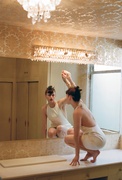
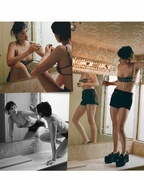
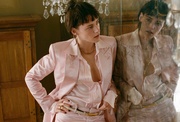
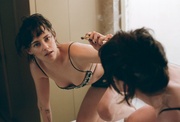
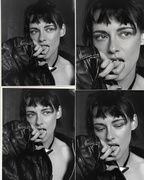
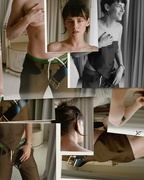
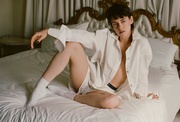
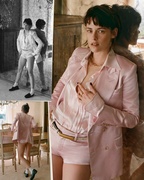
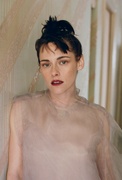
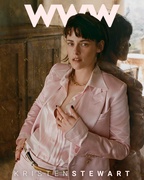
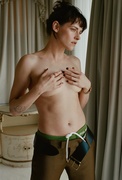
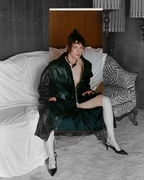
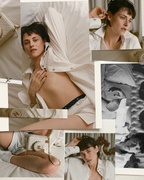
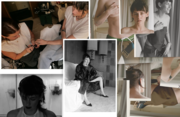
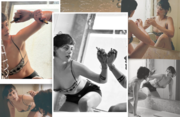
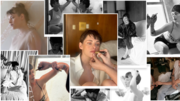
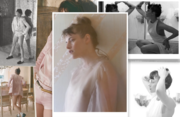
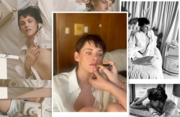
No comments:
Post a Comment
What do you think of this?